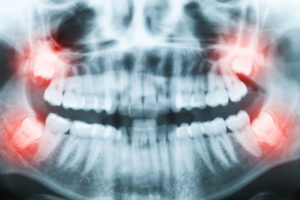Wisdom teeth are considered to be a third set (upper and lower jaw) of molars.
They typically appear during your last few teen years and early twenties. There are some people who are lucky enough to experience no problems what-so-ever with their wisdom teeth. If they are developing in the proper position and not causing pain or problems, there is no need to pursue any sort of treatment or extraction.
There are three main reasons as to why your wisdom teeth would need to be surgically removed:
1. There is not enough room for them to fully erupt.
When there is not enough space for your wisdom teeth to pop through the surface of your gums, you run a higher risk of them being impacted. Most commonly, this means that your wisdom teeth have made it through the bone but cannot get through the gums.
Sometimes symptoms come along with this type of impaction. Other times, one may not experience a single symptom. This is one of the reasons why frequent visits to our office are very important. In order to look in to this, an x-ray is required.
2. The wisdom teeth are not coming in at the proper vertical angle.
A lot of times wisdom teeth develop in different positions. They could even be developing facing towards your other teeth instead of growing upwards. When this occurs, people face problems with their other fully developed teeth, crowding and can even cause poor bite and jaw alignment. As stated above, in order to see how your wisdom teeth are growing, which direction or any other abnormality, x-rays will need to be taken.
3. Partially erupted wisdom teeth.
Sometimes the wisdom teeth are able to poke through the top of the gum but cannot fully erupt. If this happens, there is an elevated chance that infection may occur. This infection is called Pericoronitis. This occurs when bacteria from plaque or food get trapped between the partially erupted tooth and the gum surrounding it.
Warning signs and symptom to look out for include:
• Red, swollen, tender gums
• Jaw pain
• Pain while trying to eat
• Bad breath
• Unpleasant taste in your mouth
If you are experiencing any of these symptoms, please give our office a call to schedule an appointment and x-rays to see exactly what is going and what steps need to be taken in order to get the problem treated and relieve any discomfort you may be experiencing. Wisdom teeth extractions are typically done by an oral surgeon, however, in some cases a certified dentist can extract them. Local anesthesia is most commonly administered. Healing time is usually less than 1 week.
Post oral surgery instructions will be explained and given to you. It is imperative that you continue to practice good oral health care during this time and to follow those instructions carefully. Having your wisdom teeth removed will not hinder the functionality of your mouth. (For example being able to eat, chew, speak or your bite position.) When an extraction is required, the younger you are when it is discovered, the better. Wisdom teeth extractions are considerably easier to extract while the teeth are still in development. If you are interested in your wisdom teeth and their current stage or any other information you are curious about, give us a ring today!
Waterford, CT 06385
Phone: 860-447-1787



